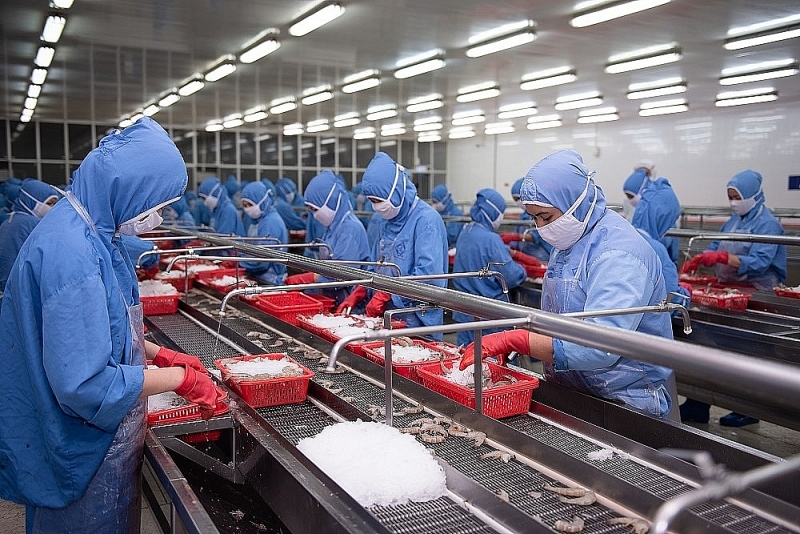Seafood enterprises gradually close factories because of lack of workers
Although the three on-site model has been implemented, less than 50% of workers stay and work in many seafood enterprises, making it more difficult for them at the peak of the harvest and export period.

Only 30-40% of workers go to work
According to Ta Ha, a pangasius market expert from the Vietnam Association of Seafood Exporters and Producers (VASEP), shrimp processing and exporting enterprises from the Central region to Soc Trang and Ca Mau said that the Covid-19 pandemic broke out in HCM City and spread to neighboring provinces and the Mekong Delta so quickly that many businesses, even those which had planned to respond in advance, were confused.
According to the leader of Sao Ta Foods JSC, to ensure sustainable production, avoid disruptions and prevent the pandemic, they have actively implemented the three on-site model before the Prime Minister issued Official Letter 969/TTg-KGVX on July 17, 2021 on the implementation of social distancing to prevent and control the pandemic in Soc Trang and 18 southern localities.
The company has tried to convince their employees in many ways such as: providing adequate accommodation, essential supplies, an additional allowance of VND50,000 - 100,000 per day to maintain production. Many enterprises, which do not arrange enough accommodation rent a hotel or a student dormitory.
However, in some enterprises, after announcing the three on-site model (working, eating, and resting on-site in enterprises or hotels), up to 30%, even up to 50% of workers resigned because of family circumstances or because they have been in contact with relatives and friends returning from Binh Duong, Long An, and HCM City.
Businesses consider this a must-do when there have been many cases of unknown source, but it is not easy.
Tran Quoc Luc, Chairman of the Board of Directors of Sao Ta Company, said that implementing the three on-site model costs a lot, including money for periodic testing, three meals per day for about 1,400 employees, and necessary items. The most difficult thing is that only about 30-40% of workers go to work, affecting the operating capacity of many businesses.
Additionally, some units have reduced their processing capacity by 30-90% due to the inability to arrange accommodation for workers. Because of the characteristics of the seafood processing industry, it is impossible to arrange accommodation for workers at the factory, even separate from the processing area, to ensure safety. Moreover, most employees of seafood processing factories are local people, who go home daily without needing to stay on-site.
Shrimp is in the peak period of production and export in the Mekong Delta because of many orders and shrimp have begun to be harvested. Despite abundant raw materials, the transportation of goods and raw materials faces many difficulties, lack of workers, significantly affecting production.
More difficulties
According to the VASEP, information from member enterprises showed that although the Ministry of Health has sent an official dispatch to the People's Committees of the provinces asking not to check the SARS-CoV-2 test certificates for drivers of freight vehicles (drivers, attendants on the vehicle, staff loading and unloading goods accompanying the vehicle), drivers have been required to have a negative test for Covid-19 in most Western provinces.
Additionally, according to a leader of a shrimp export enterprise, there are many things that happened during the difficult time, which hindered enterprises. For example, trucks carrying shrimp feed to farming areas are subject to vehicle load checks, or trucks carrying shrimp shells are not allowed to go through Can Tho to sell to processing factories because they are not essential cargo trucks.
Due to the pandemic prevention requirements, many packaging, service and auxiliary materials factories for the seafood industry were also closed. Seafood enterprises continued to look for alternative suppliers, but most of them negotiated to extend the delivery time.
According to expert Ta Ha, while businesses in the West cannot buy shrimp raw materials that are in season, enterprises in coastal provinces such as Binh Dinh, Kien Giang, and Ba Ria - Vung Tau reduced capacity by 20-70% due to a lack of raw materials, localities are all under social distancing measures or some fishing ports are blocked due to Covid-19 positive cases. Sea freight increased sharply, lack of containers, payment and delivery time of importers is also longer due to congested international ports, which also makes enterprises face more difficulties.
After implementing the three on-site model, businesses continuously manage and balance their finances; change, rearrange production plans in order of priority for each customer, each order, and make the most of the goods in stock. However, many customers and importers demanded to cancel orders and be compensated for late delivery. The desire of enterprises at this time is not the growth rate but that the workers are vaccinated as soon as possible to work safely.








